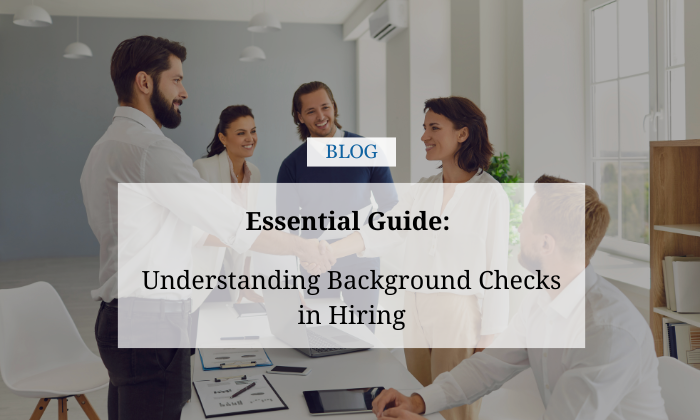In today’s highly competitive job market, small businesses are under immense pressure to swiftly identify and onboard the most suitable candidates. Despite the urgency, it remains crucial to implement measures that guarantee the qualifications, reliability, and competence of potential hires.
An interesting statistic reveals that a staggering 94% of businesses acknowledge performing some form of background check on prospective employees. By opting for background checks in the realm of small enterprises, you not only safeguard the well-being of your customers and employees but also fortify the reputation of your business.
Securecheck360
Here at Securecheck360, we’re experts in delivering reliable, fast turnaround and affordable Employment Background Screening Services, serving businesses of all sizes across the globe. Our customized solutions are finely tuned to meet the unique requirements of small, mid-sized, and large organizations. We’re dedicated to equipping companies with the vital tools and insights they need to make well-informed hiring choices. As one of the leading background verification companies, we’re committed to supporting even small businesses as trusted background check companies for small businesses to ensure they have the confidence to build the best teams for their success.
To know more about our services, book your free demo today!
Why are Background Checks Important for Small Businesses?
Implementing background checks in small businesses holds significant importance for various reasons:
- Mitigate Risks of Employee Theft and Fraud: Conducting background checks reveals an applicant’s criminal record, aiding in screening out individuals with theft convictions. This proactive approach reduces the risk of internal thefts, a factor highlighted in the Association of Certified Fraud Examiners 2022 Report to the Nations. The report notes that businesses with fewer employees in 2021 reported the highest median losses from internal thefts and fraud, reaching $150,000. For small businesses, absorbing such losses could be challenging, potentially leading to closures.
- Ensure Candidates Are Qualified for Their Jobs: Background checks provide insight into an applicant’s qualifications and experience, ensuring that they possess the necessary skills for their roles. Hiring unqualified candidates may result in productivity issues and potential liabilities.
- Avoid Substantial Expenses from Hiring Mistakes: Selecting the wrong individuals for open positions can result in increased turnover rates and costs associated with training new hires.
- Maintain a Safe Work Environment: Thorough pre-employment screens offer a glimpse into an applicant’s safety practices. Opting for careful candidates contributes to fostering a secure work environment.
- Reduce Liability Risks: Background checks serve as a preventive measure against lawsuits related to negligent hiring or retention of incompetent or unsafe employees. Proactively screening applicants helps minimize the risk of legal actions against the business.
What Shows up on a Small Business Background Check?
The components of a small business background check can vary depending on the industry. However, most small businesses typically request the following types of searches:
- Criminal History: A background check for criminal history in employment unveils whether an applicant has a criminal conviction or a pending criminal matter. Information provided may include the offense date, nature of the offense, severity (felony/misdemeanor), disposition (if available), disposition date (if available), and any sentence information (if available). In states allowing the expungement of certain convictions, information about expunged convictions won’t be included.
- Employment Verification: Employment verification aids in confirming the accuracy of an applicant’s reported employment history. It reveals details such as the employer’s name and address, dates of employment, and job titles/positions for each of the applicant’s past jobs.
- Education Verification: This check ensures the truthfulness of an applicant’s educational claims. Information obtained includes school names/addresses, dates of attendance, and whether any diplomas, degrees, or certificates were conferred.
- Professional License Verification: For positions requiring licenses, businesses often request professional license verification. This includes details like the type of license, issuance date, license status, expiration date, and any discipline/sanctions, suspensions, or revocations against the license.
- Pre-Employment Drug Screens: Many employers mandate pre-employment drug tests to maintain a safe work environment. These screenings reveal recent usage of substances such as THC (marijuana), cocaine, opiates, amphetamines, and PCP (phencyclidine) by the applicant.
Understanding the intricacies of each type of background check is crucial for small businesses to make informed and responsible hiring decisions.
Background Check Laws Small Businesses Should Know
Conducting employment background checks is not only crucial but understanding the laws governing them is equally imperative.
Failure to adhere to background check laws may expose your company to significant penalties and potential legal liabilities.
Federal Background Check Laws
Fair Credit Reporting Act (FCRA)
The FCRA, a cornerstone consumer privacy law, regulates the collection, retention, and reporting of information by consumer reporting agencies (CRAs). It also delineates the permissible actions employers can take with the received information. This law applies to both background check providers and employers receiving such reports.
In the case of a background check report containing adverse information about an applicant, compliance with the adverse action process is mandatory before making any adverse employment decision based on the report.
Title VII of the Civil Rights Act of 1964 (Title VII)
Title VII of the 1964 Civil Rights Act prohibits employers from discriminating against applicants and employees based on protected status. Enforced by the Equal Employment Opportunity Commission (EEOC), this law prompts employers to follow specific guidelines when a background check discloses an applicant’s arrest or criminal conviction. It necessitates a thoughtful assessment of the conviction’s relevance to the job before deciding against hiring the individual.
State Background Check Laws
Numerous states have enacted laws governing background checks, each with its own nuances. Consulting with legal counsel is essential to understand the specific regulations applicable in your state.
An increasing number of states and cities have implemented ban-the-box laws, dictating the stage in the hiring process when inquiries about criminal history and background checks can be made. Staying abreast of these evolving regulations ensures compliance and responsible hiring practices.
How to Run a Background Check on an Applicant
Small businesses employ two main approaches for conducting background checks: the do-it-yourself (DIY) method and partnering with a trustworthy background check provider.
1. DIY Background Checks: Some small businesses opt for DIY background checks, involving the solicitation of information from various state agencies, past employers, and educational institutions. Additionally, they may contact the references listed by applicants, perform social media scrutiny, and conduct Google searches for comprehensive insights.
However, DIY background checks present challenges such as being time-consuming, potentially taking weeks to compile necessary information—something many businesses can ill afford. Moreover, there’s a risk of obtaining unreliable data, with information being inaccurate, outdated, or incomplete. This method may also inadvertently breach background check laws, opening the door to potential legal liabilities for the business.
2. Working with a Provider of Small Business Background Check Services: A more effective approach is to collaborate with a reliable background check provider, such as Securecheck360.
At securecheck360, we specialize in delivering background checks tailored for small businesses across diverse industries. Our commitment to staying current with relevant laws ensures that the reports we provide adhere to Fair Credit Reporting Act (FCRA) standards, mitigating any legal risks for our clients.
Benefiting from extensive resources and employing advanced research techniques, we prioritize efficiency, often delivering comprehensive background check reports within a matter of hours. This streamlined process not only saves time but also enhances the accuracy and compliance of the information obtained.
How to Develop a Background Check Policy for Your Small Business
If you intend to conduct background checks at your small business, you need to have a written background check policy in place.
Creating a policy for background checks helps to ensure that your business will maintain consistency and fairness in the process.
1. Make Your Policy Apply Company-Wide: Your policy should apply company-wide at your business, and it should be applied consistently to all applicants.
2. Ensure Your Policy Complies With All Relevant Laws: You should also make sure that your policy complies with all relevant state and federal laws, and you should regularly review and update the policy so that it accurately reflects legal changes.
3. List the Types of Background Checks and Who Will Undergo Them: Include a list of the types of background checks you will conduct on applicants and/or current employees.
Make sure your background check policy only includes the types of background checks that are legally authorized in your state.
It should also address when in the hiring process they will be conducted and who will undergo them.
4. Include the Responsibilities of the Hiring Managers: Make sure you list the responsibilities of your hiring managers, including the need to disclose your intent to conduct background checks and obtain written consent from your applicants or employees before they are conducted.
5. Provide Copies to Everyone: Once you have drafted a background check policy, make certain that everyone in your business receives a copy so that they understand your requirements.
Conclusion
The importance of background checks for small businesses is crucial. Whether opting for DIY methods or partnering with a trusted provider like securecheck360, adherence to relevant laws is essential.
DIY checks may pose challenges such as time inefficiencies and non-compliance risks. In contrast, reputable providers offer a streamlined and efficient solution, ensuring accurate, FCRA-compliant reports promptly. The choice between these approaches can significantly impact the hiring process, contributing to a secure and compliant work environment for small businesses.







